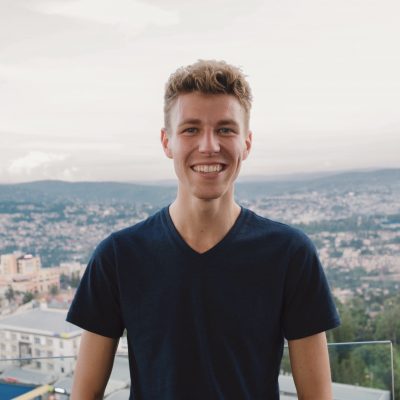Student Spotlight: Rob Swanda

May 17, 2021
Rob Swanda is a doctoral candidate in biomedical and biological sciences from Windsor, New York. After attending Syracuse University as an undergraduate, he chose to pursue further study at Cornell for the opportunity to work with his advisor on the advancements of mRNA in medical therapeutics.
What is your area of research and why is it important?
Cellular proteins are involved in every function we do, from hormone production, energy metabolism, to even reading and understanding this sentence. My research focuses on the instructions that are used to make proteins, mRNA or messenger RNA. I design mRNA molecules that can serve as new therapeutics to slow cancer growth. I heavily investigated a process known as the integrated stress response, which when turned on in our cells stops protein production and can signal cells for death. My research goal is to use the mRNAs I have designed to turn on this stress pathway and trigger death among cancer cells.
What are the larger implications of this research?
I predict the use of mRNA in medicine exponentially expanding over the next several years. We can currently see how mRNA is playing a role in the COVID-19 pandemic by being leveraged by several vaccines (Moderna & Pfizer/BioNTech). The use of mRNA is very versatile and it’s hard for me to find many circumstances where it could not be beneficial (in regard to human or animal health). My project’s role is setting the groundwork for using this technology in cancer, and I hope it can serve as a building block for the next group of scientists to push the boundaries of medicine even further.
What inspired you to choose this field of study?
I have always been interested in the intersection of biochemistry and nutrition, so to have the chance to work on mRNA in the context of diseases was a perfect fit for my intellectual curiosity. The biomedical and biological sciences program offers a wide range of interdisciplinary research since it is an umbrella program across campus. I have learned a tremendous amount from my PI, Dr. Shu-Bing Qian, who continues to push the boundaries of molecular biology and pioneer new advances that can be leveraged to improve human health. His work ethic and tireless efforts inspire me to become a better scientist, educator, and innovator.
What does it mean to you to be a Bouchet scholar?
All the progress in the world has been made by individuals analyzing the systems in place around them and questioning the wrongs and injustices they see. The Bouchet scholars represent innovators, story tellers, and critical thinkers who seek to make the world a more equitable place for all people. This organization will allow each of us to mutually learn from one another to become better advocates in our own circles, while also allowing these circles to blend and evolve. Additionally, I am excited to be involved with colleagues who advocate for advancements in higher education, which requires multidisciplinary research throughout departments, universities, and that spans borders.
How do you exemplify the five pillars of the Bouchet Society – character, leadership, advocacy, scholarship, and service?
Each interaction we have is a chance for us to learn from another individual, a concept of mutual learning. This has been a critical component of my Ph.D. at Cornell and the way I am able to grow as a researcher, a scientist, and a person. I have leveraged the cumulative knowledge of many of my peers and teachers to push the boundaries of my scientific discoveries, enhance my communication efforts, and serve as a mentor. I led service-learning projects in emerging markets in Colombia, Kenya, and Rwanda; I have sought to educate the public about scientific advancements regarding vaccine and drug development; and I use my voice to stand up for those who may not be able to do so for themselves. During these times, I have equally learned from each interaction as questions are raised, new information is obtained, and additional viewpoints are analyzed. These are just a handful of examples that have exemplified the pillars that the Bouchet Society stands for.
What are your hobbies or interests outside of your research or scholarship?
Every day you can find me running around Cornell’s campus. Actually, some of my best scientific ideas have come about while partaking these daily runs! I also enjoy making science accessible for those not in the field. With the help of amazing scientific friends, I have created a series of education videos about the COVID-19 vaccines which have been watched by over five million people worldwide. It has been extremely heartwarming seeing individuals from various countries learning about biochemistry, asking questions, and trusting science/medicine.
Why did you choose Cornell to pursue your degree?
Desire to work in cutting edge research with my PI, Dr. Shu-Bing Qian, on the advancements of mRNA in medical therapeutics.
